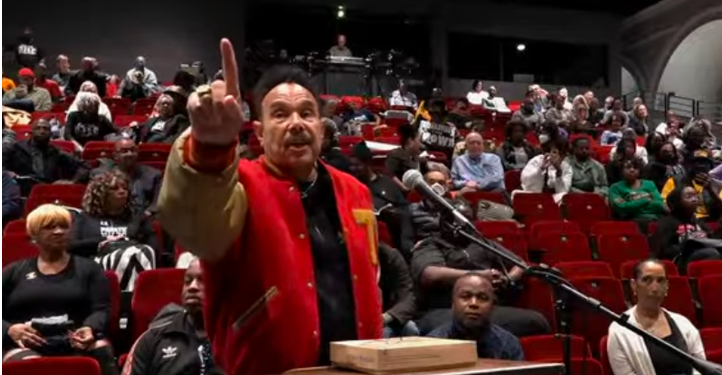At a meeting of the California Reparations Task Force on May 6, 2023, Reverend Tony Pierce demands reparations worth millions of dollars for each Black Californian. (Screenshot of YouTube from California)
“You are aware that the figures should correspond to what an acre was back then. We were allocated 40, OK? We were granted forty acres. You are aware of that number. You keep attempting to discuss the present, yet you research slavery and say nothing about it,” Pierce said. “Therefore, the equivalent amount from the 1860s for 40 acres to the present day is $200 million for each African-American.”
Pierce, who shouted the majority of his remarks, directed his ire at the task force for, in his opinion, not advancing a reparations plan that was ambitious enough.
“You’re not supposed to be afraid,” he stated. “You are simply expected to convey the truth. You are not intended to serve as gatekeepers. You should state what the people want and listen to what the people have to say.”
Pierce concluded by issuing a warning to the chief elected official of California: “Tell Governor Newsom we’re coming. He recognises me.”
In a March estimate, economists predicted that California’s reparations proposal could cost the state more than $800 billion. The task force, which consulted five economists and policy experts to arrive at the figure, stated at the time that the sum did not include compensation for property the group claims was unjustly seized or for the devaluation of Black-owned businesses.
The annual state budget of California is approximately $300 billion.
This week, however, the task force published its most recent proposals, which do not contain an overall cost estimate but instead outline how California could compute how much money Black residents have lost due to discrimination from 1850, when the state was founded, to the present day.
The report identifies specific forms of racial discrimination that have resulted in monetary losses and indicates that these losses should be reimbursed to black residents.
These estimates include $2,352 per person per year of residence in California due to the overpolicing of Black communities, $3,366 per person per year of residence due to “discriminatory lending and zoning,” $13,619 per person per year of residence due to “injustices and discrimination in health,” and $77,000 per person due to Black-owned business losses and devaluations.
In its most recent documents, the task force also urges that eligible Black Californians receive cash “down payments” as soon as possible, pending the calculation of the total amount of money lost due to racism and enslavement.
A Black person who has lived their entire existence in California until at least the age of 71 could potentially receive over $1.2 million in lifetime restitution.
According to activists who spoke at the gathering, such proposals fall short of what is required to compensate Black Californians.
“$1.2 million is woefully inadequate. It should begin at a minimum of $5 million, similar to San Francisco, said one woman. “We desire direct financial payments similar to how stimulus [checks] were distributed. It is our inheritance, and we are capable of managing it.”
The city of San Francisco is weighing its own reparations proposals at the municipal level, including a proposal to give Black residents $5 million each.
Others at the meeting concurred that the current task force plan is inadequate. One speaker urged the task force to release $5 million in reparations, as San Francisco is contemplating.
She stated, “This one million dollars we’re hearing in the news is insufficient and a further injustice if that’s what this task force is going to recommend for the 400-plus years of slavery and injustice that Black Americans have been forced to endure.” Even throwing a million dollars at us is reprehensible.
Regardless of the final figures, it is unclear how California could afford to pay each eligible Black resident millions of dollars. Newsom announced in January that the state’s projected budget deficit for the upcoming fiscal year is $22.5 billion. In a report issued weeks later, the California Legislative Analyst’s Office, a government agency that analyses the budget for the state legislature, estimated that Newsom’s projection was off by approximately $7 billion.
Leaders of the task force have stated that they anticipate the legislature to determine actual reparations amounts. According to representatives of the California Department of Justice, the legislation establishing the task force did not instruct the committee to identify funding sources.
In addition to arguing that reparations proposals are fiscally unfeasible, critics contend that it makes no sense to implement them because California never permitted slavery.
Proponents counter that racial discrimination in the state has devastated the Black community and cost it countless dollars.
The task force also proposes several policy changes to combat racial discrimination and for California to issue a formal apology for slavery and anti-Black bigotry, enacted by the legislature and signed by the governor.
According to the task force report, the reparations programme would be administered by a new state agency that would determine eligibility and distribute funds.
The majority of speakers at Saturday’s meeting supported reparations. Despite this consensus, conflicts broke out throughout the chaotic, emotionally charged gathering. Indeed, numerous attendees spoke out of turn and interrupted one another, prompting Kamilah Moore, the task force chief, to repeatedly request that security remove individuals.
Several times, activists in the room engaged in shouting matches, necessitating a halt in the meeting to restore order.
Saturday evening, the reparations task force will vote on its most recent recommendations. The state legislature is due a final report with the panel’s official recommendations by July 1.














































